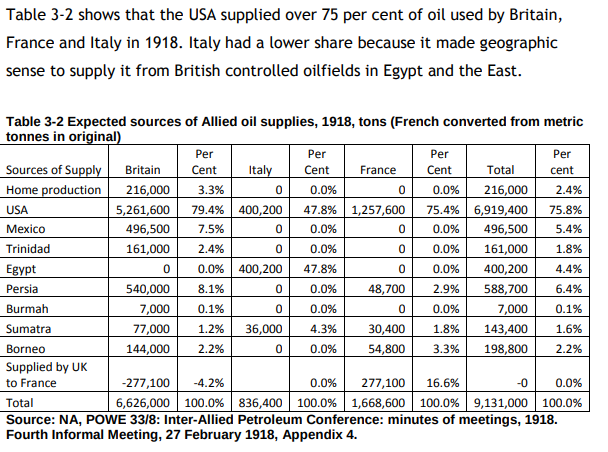And this is the scenario I am tinkering with. To be honest I find it rather finely balanced, the CPs do not lose but cannot win, the Entente cannot lose but do not win. The only two powers that matter are the UK and Germany, they are the only two that can continue this war and muster the resources for an offensive or offensives to decide things, including losing those and being defeated. France is far tougher than usually given credit for, it can sustain the defense longer than 1917 but is losing all hope of waging any decisive war, same for A-H, it is far more survivable than assumed but is rapidly losing the ability to stay in the war. Frankly I think both Italy and the OE can fight on but are too beholden to their sides to do so and both really have little but status quo to hope for, more likely each faces losing more than they can attain. Both France and the UK actually have more financial resources to tap and without USW find it easier to sustain the war but digging deeper hurts them deeper too. Germany can only win the war by winning it but its resources are tapped, yet on the defensive is virtually immovable. And frankly the ebb and flow on other fronts does little to alter the core friction point, Belgium and Northern France, with the exception that Russia can go separate peace and suddenly unravel any hope of an Entente victory. So I do not find a clear advantage to either side. But tides are still subject to turns.
Germany will annex Luxembourg, the Austro-Italian border likely settles back to pre-war, Russia loses Poland, likely modern Latvia and Lithuania, likely Finland and maybe Western Ukraine and parts of White Russia. A-H gains Serbia, Montenegro and Albania. Bulgaria likely gaining something there too. Romania is lost to the CP. Italy loses the Dodecanese. The OE is all about what the UK wants but is forced to give up. Germany holds the high cards, the UK must give something to gain back independent Belgium and France must add to it to secure Northern France. A-L is securely German with some minor additions likely. Mostly a pre-war border. Frankly only East Africa is of value to London, SWA and the rest are brides to her allies, but here are the cheapest currency. I seriously question if Germany cares but regaining her colonies might be the first step despite it being a trope. I would suspect France is forced to add some stuff around Togo, Kamerun, the Pacific, or China. The UK might need to add a few minor tid-bits such as Walvis Bay or Zanzibar but frankly Britain does not need to give up much, and shouldn't. That includes the Congo, Germany gets no reward for invading Belgium like that despite the tropes. Indeed I see little offered to give Germany such prizes as Indochina or such, most important to Britain will be to mitigate German dominance of the continental economy and to secure some form of naval supremacy. Pride will make Germany seek back its place in China and economics forces her to bargain for the OE.
At best we get a restored Belgium and about 99% pre-war Franco-German borders. At worst we get Germany and A-H expended at Russia's expense and in between the OE goes back to pre-war but less solidly a CP ally. Britain can carve off the OE but why? To share with France? Germany will push back on the Mesopotamian oil and that is the valuable bit. Palestine feels like a prize but does it really do much to secure the Canal? British gains might be on the peninsula but overall I think the OE is not imploded. But I would still not call it status quo antebellum per se. This will be a warped version. At bottom it becomes a bipolar world, the British facing the Germans, Germany grappling with holding together the continent, Russia bursting with chaos, both the OE and A-H fractured, China remaining a frontier all powers struggle over, Africa still subjugated, cracks deepening in the Empire, the home front totally disillusioned, the USA still sleepy, and not one happy face. This peace will be more byzantine than the prelude to war despite surface similarity.
Hardboiled I find that after an armistice some peace must take root, it will be guided by previous Congress like dictates but just as compromised. The alternative is a cold war like divided Europe with a scratched border and occupied places, and maybe we are instead stuck there, Britain undefeatable at sea, Germany entrenched upon the land, an ugly status quo. In the end it will be what Britain gives up to get what it wants more than I think is obvious from the usual Britain cannot be defeated so can do as it pleases tropes. In fact the British Empire cannot be forced but at what cost should it defend anything but its interests? Belgium and France become the front line to harass Germany, Italy too, the OE can be made a murky back and forth, Russia is the key to breaking German hegemony, as is German dependence upon export trade. Britain has levers it must pull because the war really gained her nothing but stronger enemies and less useful allies. Personally I find it more wickedly complicated than if I were to predict OTL and the next 100 years, it looks easier than it is, the better guide is how little must we give up, rather than what can we gain.
